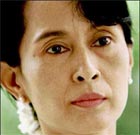UN special envoy to Myanmar fails to see Aung San Suu Kyi
 Yangon - Ibrahim Gambari, UN special envoy to Myanmar, visited the compound of detained opposition leader Aung San Suu Kyi Friday but she did not come out to greet him, witnesses said.
Yangon - Ibrahim Gambari, UN special envoy to Myanmar, visited the compound of detained opposition leader Aung San Suu Kyi Friday but she did not come out to greet him, witnesses said.
Gambari, who arrived in Yangon Monday, went to Suu Kyi's Yangon home at 7:30 am (0100 GMT) and waited at the front gate for an hour but the Nobel Peace Prize laureate did not come out, witnesses said.
The road outside Suu Kyi's compound has been heavily barricaded since Thursday evening with four police officers posted outside its front gate.
Suu Kyi has been under house arrest since May 2003, being kept in near-isolation by the ruling junta, which recently extended her imprisonment, adding another six months to a year to it.
On rare occasions, she has been allowed to leave her house under army escort to meet with visiting UN special envoys, such as Gambari and his predecessors.
On Wednesday, a government car was seen entering Suu Kyi's compound, apparently to take her to meet Gambari, but she never got into the car.
Gambari met with executives of Suu Kyi's party, the National League for Democracy (NLD), on Wednesday and informed them that one of his priorities on this trip was to meet with Suu Kyi.
The NLD won the 1990 general election by a landslide but has been denied power by the country's entrenched military establishment, which has ruled Myanmar since 1962.
Gambari told the NLD that UN Secretary General Ban Ki-moon was hoping to visit Myanmar in the last week of December if conditions are appropriate to discuss the country's political problems.
Ban was last in Myanmar in May when he made an emergency visit to pressure the country's junta to allow entry of international aid and relief workers in the wake of Cyclone Nargis, which left about 140,000 people dead or missing.
Ban was criticized at the time for concentrating on the aid and neglecting Myanmar's long-simmering political caldron, such as the junta's refusal to free Suu Kyi and other political prisoners or to introduce genuine political reforms.
This week's visit is Gambari's fourth since last year to Myanmar, also known as Burma, where he has been handed a mandate by the United Nations to deal with the country's military regime in addressing international concerns about human rights violations, slow-paced political reforms and the ongoing detentions of political prisoners.
The State Peace and Development Council, as Myanmar's junta calls itself, has shown little willingness to comply with Gambari's overall mission.
On August 7 in Yangon, for example, Myanmar authorities arrested three members of the All Burma Federation of Student Unions and two members of the 88 Generation Students, two pro-democracy groups. Their whereabouts remain a mystery.
Myanmar has been under the equivalent of martial law since 1988 when the army unleashed a brutal crackdown on a nationwide pro-democracy movement, which left an estimated 3,000 people dead and thousands more in prison.
Bowing to international pressure, the regime held a general election in 1990, which the NLD won in a landslide.
Instead of acknowledging the outcome of the polls, the junta has blocked the NLD from power for the past 18 years, keeping Suu Kyi - who received the Nobel Peace Prize in 1991 - under house detention for 13 of those years. (dpa)